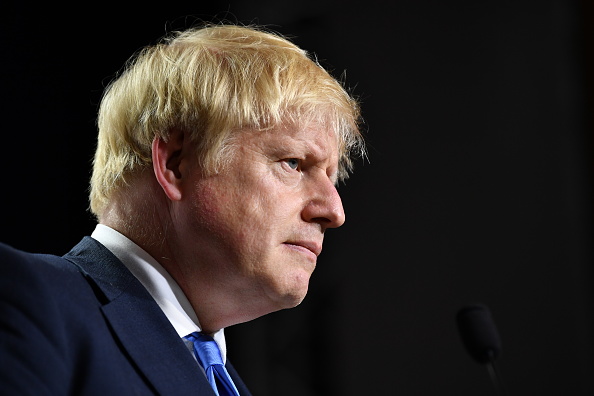Brexit: Sterling sinks as Boris Johnson asks Queen to suspend parliament

The pound plunged against the US dollar today as Prime Minister Boris Johnson is reportedly preparing to suspend parliament to pursue a no-deal Brexit.
Sterling crashed 0.839 per cent to around $1.218 this morning, losing gains from yesterday amid reports that the government is expected to ask the Queen to suspend parliament.
This afternoon it slipped to 0.67 per cent down against the USD dollar at 1.2205.
The pound also dropped as much as 0.86 per cent against the euro, hitting €1.098 before trimming losses to stand 0.64 per cent down.
Read more: Government expected to ask Queen to suspend parliament
Sterling ‘falls off a cliff’ amid no-deal Brexit fear
“Sterling has fallen off the cliff as investors have become increasing anxious about the Brexit chaos,” said Naeem Aslam, chief market analyst at TF Global Markets.
He said: “Boris doesn’t want anyone to stop his plan of no-deal Brexit and if the Queen approves his request then there is only his way or the highway.
“The ride on this highway is going to be more turbulent than ever and British politicians do not realise this. Infect they have made circus out of Brexit.”
David Cheetham, chief market analyst at XTB, said: “There’s been some selling seen in the pound after a couple of recent developments on the Brexit front with an acrimonious outcome looking more likely by the day.”
He added: “First off, reports that parliament could be suspended in the coming days hit the wires with rumours swirling around Westminster that a privy council are set to head to Balmoral to meet the Queen and make the request.
“Shortly afterwards, speculation grew further when additional reports suggested this means that Boris Johnson is planning on beginning a new session of parliament some five weeks later than previously thought, with a fresh Queen’s speech on or around 14 October.”
The dive comes amid speculation that Boris Johnson’s government will ask the Queen to suspend parliament in a move that could stop opposition MPs from passing a law to prevent a no-deal Brexit.
Time running out to block a no-deal Brexit
Over the weekend Johnson met with fellow European leaders at the G7 summit in France for talks, but disagreements over a £39bn Brexit divorce bill threatened to jeopardise hopes of a trade deal between the two sides.
Michael Hewson of CMC Markets told City A.M.: “This is not a surprising reaction given the rebound we saw yesterday in the wake of yesterday’s events designed at trying to prevent a no-deal Brexit.
“This move cuts down the amount of time available to MPs to thwart such an outcome and as such makes the prospect of a no deal Brexit much more probable.”
Read more: The summer is over, now it’s back to Brexit
Ricardo Evangelista, a senior analyst at Activtrades, said: “The pound is once again on the backfoot, both against the euro and the dollar. This follows yesterday’s recovery, on the back of news that opposition leaders had agreed on a strategy, to prevent a no-deal Brexit.
“The markets regard no deal as the worst possible outcome for the British economy. News that there will be a cross-party effort to counter Prime Minister Johnson’s plans to leave on the 31 October no matter what, were enough to fuel sterling gains of nearly 0.5 per cent to the dollar.”
Labour leader Jeremy Corbyn has united with rival parties to propose legislation aimed at stopping a no deal scenario.
MPs from the Liberal Democrats, SNP, Plaid Cymru and The Independent Group for Change joined this rebel alliance.
One tactic believed to be under consideration is another extension to Article 50, which originally was due to enact Brexit on 29 March.
Proroguing parliament ‘profoundly undemocratic’
Gilles Moec, group chief economist at Axa Investment Managers, warned Johnson’s move to suspend parliament undermines apparent progress at the G7 last week.
“Our fundamental view has not changed,” he added. “It is unlikely that any positive outcome on Brexit – such as a deal, an extension or even a second referendum – can occur without the UK – and UK assets – first going through an exacerbation of the current crisis sentiment.
“It is not constitutionally absolutely clear that those in parliament refusing a no deal can actually, within the current time limits, impose their view on the government, just as it is also unclear whether changing the backstop would be enough for the Eurosceptic wing of the Tory party to support a new deal sponsored by Boris Johnson.
“New elections may be needed before any final clarification, and given the British first past the post electoral system and the current dispersion of the electorate, uncertainty would be very high.”
Figures such as former Prime Minister John Major have threatened to use the courts to block Johnson in a no-deal Brexit scenario.
Former Treasury boss Philip Hammond has also vowed to oppose it.
He tweeted today that it would be “a constitutional outrage” if parliament could not have its say on how the UK leaves the EU on Halloween. Hammond called the move “profoundly undemocratic”.